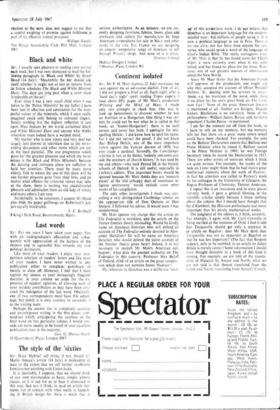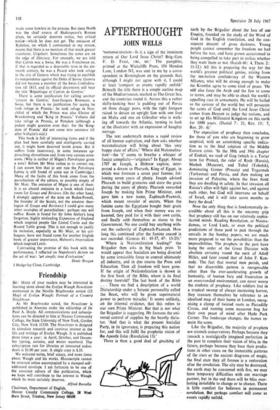Continent isolated
Sir: Mr P. H. Muir (Letters, 21 July) overstates his case against me as adrocatus diaboli. First of all, I did not prepare a brief at all. Each night, after a. 'hard day's night' spent reading Tripos papers. I read about fifty pages of Mr Muir's production (Printing and the Mind of Man). I made only two attempts to check him. One was to look up Semmelweis to discover whether he was an Austrian or a Hungarian. One thing I was cer- tain he could not be was what he is called in this book, an 'Austro-Hungarian': there is no such person and never has been. I apologise for mis- spelling Hefele: I did know how to spell his name, but I did not correct the proof. I did not know that Bishop Hefele, one of the most important voters against the Vatican decrees of 1870, was ever made a cardinal. Secondly, the Concilienge- schichte is not, as he thinks, 'entirely unknown out- side the seminars of church history.' It was used by me and others—who took Period III in the history schools of Oxford. It is still useful, especially in Leclerc's edition. That important books should be ignored because Mr Muir thinks they are 'museum pieces' of the 'old unhappy days of venomous re- ligious controversy' would exclude some other books of his compilation.
The only other investigation I made was con- sulting a very distinguished Cambridge scholar on the appropriate title of Don Quixote or Don Quijote. I followed his advice. It would seem I was misinformed.
Mr Muir ignores my charge that the article on The Federalist is worthless, and the article on the Turner frontier theory misleading. Would he kindly name an American historian who will defend an account of The Federalist entirely devoted to Alex- ander Hamilton? Or will he name an American historian who would defend the naive account of the frontier theory given here? Indeed, it is not necessary to consult Mr Muir's American col- leagues: what does the greatest authority on The Federalist in this country, Professor Max Beloff of Oxford, think of an article on the great compila- tion which does not mention James Madison?
My reference to Quechua was a deliberate 'send-
op of this pretentious work. I do not believe that Quechua is an important language for the modern- minded man : but millions of people speak it. It is now a political language in use in Peru. There is no one alive, nor has there been anyone for cen- turies, who could speak a word of the language of Eliot's Indian Bible. The really outrageous error of Mr Muir is that he has found room for Eliot's Bible, a mere curiosity even when it was pub- lished, and has found no place for the Jesuit Rela- tions, one of our greatest sources of information about the New World.
Since Mr Muir thinks that his American friends will approve of the production, one might ask
why they accepted the account of Oliver Wendell
Holmes, Sr.. dealing with his services to anaes- thesia, e.g. his invention of the word, while there
is no place for his son's great book on The Com- mon Law? None of the great American lawyers is mentioned at all. Neither are Savigny, Duguit, Kelsen. Blackstone is no substitute. None of the philosophers—William lames, Royce, and, far more important, Charles Peirce—is mentioned.
I am for the moment cut off from the book, so I have to rely on my memory, but my memory tells me that there are a great many errors which could have been checked. For example, the note on the Balfour Declaration asserts that Balfour was Prime Minister when he issued it. Balfour ceased to be Prime Minister in 1905; he was Foreign Secretary when he issued the Declaration in 1917.
There are other errors of omission which I think are quite serious. For example, the reader of the note on Lister might think that he had shown great intellectual curiosity about the work of Pasteur: in fact his attention was called to Pasteur's work by his colleague in the University of Glasgow, the Regius Professor of Chemistry, Thomas Anderson.
I repeat this is an inaccurate and in some places slovenly book. I gave a general blessing to the scientific articles simply because I know nothing about the subject. But I should have thought that for d'Alembert, the Discours prfliminaire was more important than his purely mathematical works.
The judgment of the editors is, I think, eccentric. For example, I agree with Mr Cyril Connolly ,in being startled at the omission of Ovid. I find it odd that Tocqueville should get only a sentence in an article on Bagehot: does Mr Muir think that Tocqueville was not as important as Bagehot or that he was less important? (The fact that Bergson appears, only to be snubbed, in an article on Julien Benda is merely comic.) Some information I should have thought desirable in a book of this kind is missing. For example, we are told of the transla- tions of Plutarch by Amyot and North; what we
are not told is that Amyot translated from the Greek and North, translating from Amyot's French,
made some howlers in the process. But since North was the chief source of Shakespeare's Roman plays, he certainly deserves notice, but critical notice—which he does not get. The omission of Rabelais, on which I commented in my review, means that there is no mention of that much greater translator, Urquhart. Sometimes the notes are on the edge of illiteracy. For example, we are told that Calvin was a Swiss. He was a Frenchman or, if that is regarded as a disputable term in the six- teenth century, he was a Picard who took refuge in the city of Geneva which was trying to establish its independence against the Duke of Savoy. Geneva did not become a member of the Swiss Confedera- tion till 1815, and its official documents still bear the title 'Republique et Canton de Geneve.'
There is some justification for calling another 'citoyen de Geneve,' Jean-Jacques Rousseau, a Swiss, but there is no justification for saying he took refuge in Prussia: he took refuge in Neu- chatel of which the Prince was also Elector of Brandenburg and 'King in Prussia.' Voltaire did take refuge in Prussia, at Potsdam (although a pedant might question even that: for the 'King- dom of Prussia' did not come into existence till after Voltaire's visit.)
This book is full of interesting items and if the plan had been carefully and intelligently carried out, it might have deserved lavish praise. But it suffers from inaccuracy, in some instances ap- proaching slovenliness and, from very curious omis- sions. (Why is neither of Migne's Patrologias given a note? Before Mr Muir rushes in to correct me, I can assure him that at any rate the Patrologia Latina is still found of some use in Cambridge.) Many of the faults of this book come from the parochialism of the editors, or possibly simply of Mr Muir. The omission of Migne is one of them. It is an absurd omission in a book which found room for Essays and Reviews. (On the other hand, I strongly approve of the note on Baden-Powell, the founder of the Scouts, not the amateur theo- logian of Essays and Reviews.) I could give many other examples of parochialism: perhaps one will suffice. Room is found for Sir John Seeley's long forgotten, highly misleading Expansion of England which inspired people like Lionel Curtis and the Round Table group. This is not enough to justify, its inclusion, especially as Mr Muir, or his col- leagues, have not found room for another English book of greater importance, Hobson's Imperialism which inspired Lenin.
Contrasting the promise of this book with the performance, I reflected on Napoleon's dictum on the art of war: 'art simple; tout er execution.'































 Previous page
Previous page